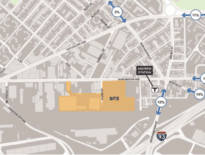Dennis Swart
President and founder, DJSA Architecture
Age: 51
Industry experience: 28 years
Hospitality projects were a leading source of DJSA Architecture’s work until mid-March, when developers hit pause on new construction and renovation projects as COVID-19 disrupted business and leisure travel. The firm has picked up the slack with a shift toward industrial and other commercial property types. Founder Dennis Swart grew up in the building industry, lugging lumber and shingles around construction sites for his father’s carpentry business, before pursuing his degree in architecture. He founded DJSA in 2004 to pursue a mix of commercial and residential projects, but now specializes primarily in the commercial sector. The firm has approximately 30 current projects, ranging from renovations to the 10 Winthrop Square office building in Boston to updates at the Courtyard Marriott in Raynham, where DJSA is headquartered.
Q: When you founded your firm, what did you envision as DJSA’s specialty?
A: It’s funny. The firm that I came from did a lot of federal and state work, and I was burned out on the heavy contract paperwork. My thought was that I was just going to do residential. But so many of my contacts were in the commercial world, so general contractors were giving me tenant fitouts. When you’re starting a business, you’ll take anything. So, I did a mix of residential and commercial for a number of years, and now we exclusively do commercial unless one of our clients needs something for their house. We don’t want a client going somewhere else.
Q: What percentage of your work focused on hospitality properties pre-COVID?
A: Up until March, I would say probably 35 percent of our work was hospitality – restaurants, hotels and function facilities – and now that has essentially gone dead. We have a couple of projects that are ongoing from pre-COVID, including a full renovation of the Courtyard Marriott in Raynham, and we just finished a beautiful hospitality project at the Pelham House Resort on the Cape. In the span of 12 hours on March 25, we lost a hotel project in East Hartford, Connecticut and two large private commercial projects that the brakes were put on. Those two may come back.
At that point, I was reeling. But everything else stayed in the pipeline and is moving forward. The Pelham House was in mid-construction and we had a phone call with the construction and design team, and the owners said they were in this for the long haul. They opened in June and had an amazing Labor Day weekend in terms of food and beverage. We have been doing a lot of industrial storage and warehouse work. Instead of 20 percent of our base work, it’s over 50 percent. That’s really the stuff that’s keeping us going, and we’re busier than we were in March.
Q: There’s been recent speculation that underperforming hotels can be converted into housing. Have you seen any interest in that strategy?
A: Right now, our hospitality clients that have budget or extended-stay hotels seem to be doing OK. Some were renting rooms for first responders. They’re at the bottom now. With a vaccine hopefully in mid-spring, we’d be probably 12 to 18 months from some early-stage recovery. I haven’t seen or heard about any [housing conversions] first-hand. I certainly could see some hotels converting some rooms to one-bedroom apartments. We’re doing a couple of multifamily projects and they want the amenities that hotels have to offer. You could take two guest bedrooms and make it into a one-bedroom apartment.
Q: Will multifamily developers promote home offices as a new unit feature?
A: It’s a different job market. People have more flexible schedules. They work from home and it’s going to be more so, so we’re designing lobbies with private informal gathering spaces. We’re working on one in Salem and the owners wanted a high-end lobby that has clustered seating, an office and a conference room: things they don’t have in their other buildings. At first that seems like a waste of square-footage, but their leasing department said these are what the other high-end apartment buildings are offering. We haven’t made adjustments to the units themselves.
Q: As part of your residential practice, you designed a home on Cape Cod with an attached aircraft hangar. What’s the story behind that project?
A: That was a cool project for a client who is a retired Royal Air Force officer. He could fly jets and helicopters, and when he came to us for that project, I was excited for the site. It’s right at the end of the runway at Falmouth Airpark, which I honestly didn’t know was there until they called me. It’s a “fly-in community” with a paved runway, and there are grass taxiways that lead behind the houses. Picture a development in Florida where they have canals for boats. Instead of boats, it’s planes.
Q: What are the growth opportunities for DJSA right now?
A: We’re going to try to build on this market here, and we are looking to expand staff, which back in April I didn’t expect. We’re seeking to fill two positions which is a good sign for us. In this time of need, we just need to meet the timelines. Hospitality will come back, and when it comes back, it will come back full force and we’ll just continue to build on it. Everything is cyclical. As far as the hospitality work, if they need a lobby sketch we’ll do that pro bono and we know that’ll pay dividends down the road.
Swart’s Five Favorite Golf Courses
- Innisbrook Copperhead, Palm Harbor, Florida
- Ritz Carlton Club, Orlando
- TPC Boston, Norton
- Dedham Country and Polo Club
- Taconic Golf Club, Williamstown




 |
| 

